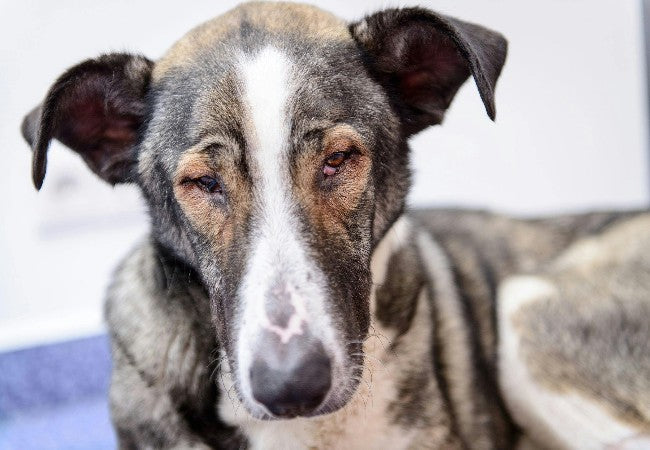Retinal Hemorrhage in Dogs: Vet-Approved Causes, Symptoms & Treatments (2025 Guide) 🐶💊

In this article
Retinal Hemorrhage in Dogs: Vet-Approved Causes, Symptoms & Treatments (2025 Guide) 🐶💊
By Dr. Duncan Houston BVSc
As a veterinarian, I occasionally encounter cases of retinal hemorrhage in dogs, a serious condition that can significantly impact a dog's vision. Understanding this condition is crucial for early detection and effective treatment. This comprehensive guide aims to educate pet owners on the causes, symptoms, and treatment options for retinal hemorrhage in dogs.
🧬 What Is Retinal Hemorrhage?
Retinal hemorrhage refers to bleeding within the retina, the light-sensitive tissue lining the back of the eye. This bleeding can result from various underlying conditions and may lead to partial or complete vision loss if not promptly addressed.
🐞 Causes and Risk Factors
Several factors can contribute to the development of retinal hemorrhage in dogs:
- 🧬 Genetic Predisposition: Certain breeds, such as Shetland Sheepdogs, Collies, Labrador Retrievers, and Australian Shepherds, are more susceptible due to inherited retinal disorders.
- 🩺 Systemic Hypertension: High blood pressure can cause blood vessels in the retina to rupture.
- 🧪 Blood Disorders: Conditions like anemia, clotting disorders, or hyperviscosity syndrome can lead to retinal bleeding.
- 🦠 Infections: Bacterial, viral, or fungal infections may cause inflammation and subsequent hemorrhage.
- 💊 Toxins and Medications: Exposure to certain toxins or medications, such as paracetamol, can result in retinal damage.
- 🧠 Trauma: Head injuries or blunt force trauma to the eye can cause retinal vessels to rupture.
- 🧬 Metabolic Diseases: Conditions like diabetes or hyperthyroidism can affect retinal health.
⚠️ Symptoms of Retinal Hemorrhage
Signs of retinal hemorrhage can vary depending on the severity and underlying cause:
- 👁️ Vision Loss: Sudden or gradual blindness, often noticed when the dog bumps into objects.
- 🩸 Visible Bleeding: Blood in the eye or changes in eye appearance.
- 💡 Pupil Abnormalities: Pupils may not respond to light appropriately.
- 🛌 Lethargy: Decreased activity levels due to vision impairment.
- 📉 Other Bleeding Signs: Presence of blood in urine or feces, or bruising on the body.
If your dog exhibits any of these symptoms, consult your veterinarian promptly.
🩺 Diagnosing Retinal Hemorrhage
Diagnosis involves a comprehensive evaluation:
- 🔬 Ophthalmic Examination: Using specialized tools to inspect the retina for signs of bleeding.
- 🧪 Blood Tests: Assessing for underlying systemic conditions like hypertension, infections, or blood disorders.
- 🖼️ Imaging: Ultrasound or advanced imaging may be used if the retina cannot be visualized directly.
- 🧬 Genetic Testing: Especially in breeds predisposed to inherited retinal diseases.
💊 Treatment Options
Treatment focuses on addressing the underlying cause and managing symptoms:
- 💉 Medications: To control systemic conditions like hypertension or infections.
- 🩹 Supportive Care: Ensuring the dog is comfortable and preventing further injury.
- 🔍 Monitoring: Regular follow-ups to assess the progression and response to treatment.
- 🔬 Surgical Intervention: In rare cases, surgery may be considered to address specific issues.
Early intervention is crucial to prevent permanent vision loss.
🛡️ Preventing Retinal Hemorrhage
While not all cases are preventable, certain measures can reduce risk:
- 🏥 Regular Veterinary Check-ups: Early detection of systemic conditions can prevent complications.
- 🥗 Balanced Diet: Ensuring proper nutrition supports overall eye health.
- 🧪 Routine Screening: Especially for breeds predisposed to retinal issues.
- 🚫 Avoid Toxins: Keep harmful substances out of reach and use medications as directed.
📱 Support and Resources
If you suspect your dog has a retinal hemorrhage, consult your veterinarian promptly. For additional support:
- Ask A Vet: Access professional veterinary advice through the Ask A Vet platform.
- Download the Ask A Vet App: For quick access to veterinary support, download the Ask A Vet app.
Early diagnosis and appropriate treatment can significantly improve your dog's quality of life.
🐾 For more expert advice and pet care tips, visit AskAVet.com.






